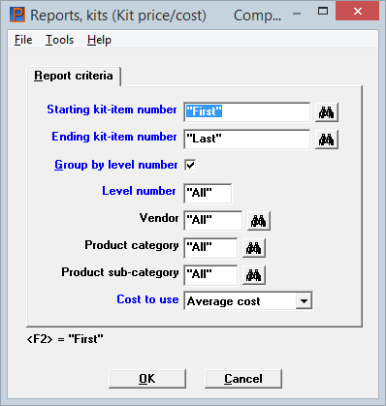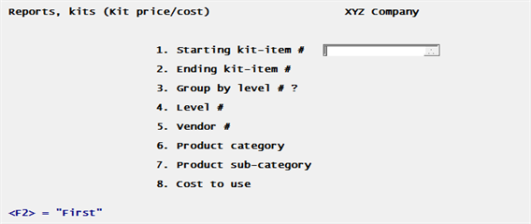
This chapter contains the following topic:
The Kit Price/Cost Report enables you to compare the selling prices of a kit with the total cost of its components.
The amount by which the price exceeds the cost (margin) is also shown. Because an item may have up to six prices, as many as six prices and six margins may appear for each kit.
This selection ignores the effect of the following:
|
|
||||||
|
|
||||||
|
|
Cost is obtained by accumulating the extended cost of all components. The detail is shown on the report. For each component, the quantity-in-kit, unit cost, stocking unit and extend cost (quantity x cost) is given.
Components are items, and cost is an attribute of the item and does not vary by warehouse. For unit cost, you specify whether to use Average, Standard or Replacement cost.
Select
Kits price/cost from the Reports, Kits menu.
The following screen displays:
Graphical Mode

Character Mode

Enter the following fields:
Ending kit-item number
Enter the range of kit-item numbers to be used for this report. Follow the screen instructions.
|
Enter |
Up to 15 digits or use the option |
|
Example |
Press <F2> for First and Last at each field |
Kit-items are assigned level numbers. Refer to the Kits chapter.
To print the report with your kit-items grouped by their level numbers, check this box. Otherwise, leave it unchecked and the kit-items are printed in order by item number.
If you uncheck the box ,the Level number field cannot be entered.
|
Format |
Graphical mode: Check box where checked is yes and unchecked is no. The default is checked Character mode: One letter, Y or N |
|
Example |
Type: N |
If you left the previous field unchecked, this field cannot be entered.
If you checked the box to the previous question, you may choose to what depth you wish to view the detail. For example, specifying a level of 3 means that components with a higher-numbered level do not appear individually on the report. They are summarized into a single level-3 component.
Enter the specific level number for the kit-items to be printed, or press <F5> to include All level numbers. Kit-items are grouped by level number.
|
Format |
One digit |
|
Example |
Cannot be entered in this example |
The report can be restricted to kits purchased from a specified vendor.
Options
Enter the vendor number for the kit-items to be printed, or use the option:
|
<F5> |
To include "All" kits regardless of whether they have a vendor number |
|
Blank |
To include only those kits which do not have a vendor number. |
Enter the product category for the kit-items to be printed, or use the option:
Options
You may also use the options:
|
<F5> |
To include "All" kits regardless of whether they have a category |
|
Blank |
To include only those kits which do not have a category |
|
Format |
Five characters |
|
Example |
Press <F5> |
Enter the product sub-category of the kit-items to be printed.
Options
You may also use the options:
|
<F5> |
To include "All" kits regardless of whether they have a sub-category |
|
Blank |
To include only those kits which do not have a sub-category |
|
Format |
Five characters |
|
Example |
Press <F5>. |
If average, LIFO or FIFO costing method is used, select Average cost or Replacement cost. In character mode select A or R.
If standard cost is used, select either Average cost or Standard cost. In character mode select A or S.
|
Format |
Graphical mode: Drop down list Character mode, one letter |
|
Example |
Select Average cost |
Select OK to display a list of printers to print the report or Cancel to return to the menu without printing.